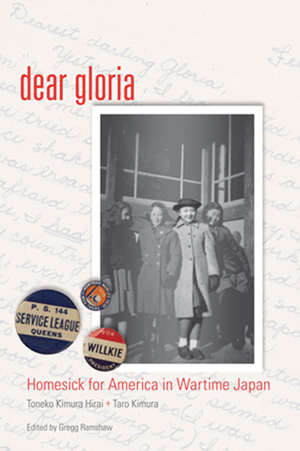Press Release: Carnegie Mellon University Press Publishes "Dear Gloria: Homesick for America in Wartime Japan"
In Tempestuous Time, Toneko Kimura's Diary Captures Fascinating Love Triangle Between Teenage Girl and Two Nations at War
Contact: Shilo Rea / 412-268-6094 / shilo@cmu.edu
 PITTSBURGH—Seventy years ago this week, Pearl Harbor was attacked, forcing the United States into World War II, and forever changing the lives of many — including Japanese citizens living in America. This tempestuous time is now documented first-hand through the words of a young girl who found herself in a love triangle with two nations at war.
PITTSBURGH—Seventy years ago this week, Pearl Harbor was attacked, forcing the United States into World War II, and forever changing the lives of many — including Japanese citizens living in America. This tempestuous time is now documented first-hand through the words of a young girl who found herself in a love triangle with two nations at war.
Published by Carnegie Mellon University Press on the 70th anniversary of Pearl Harbor, “Dear Gloria: Homesick for America in Wartime Japan” is the diary of Japanese teenager Toneko Kimura, written in the form of letters to her childhood best friend, Gloria Goodman. Kimura, then 13, started the diary after leaving the United States, where she had been living since she was 5 years old.
“I loved America almost as much as Japan,” Kimura wrote. “I was brought up there. I sang their national anthem and even pledged allegiance to their flag. I lived among them and knew their every sorrow and happiness. But I had a country. I belonged to a country that hated America so I had to hate too. I had to hate what I loved most. …”
Speaking only rudimentary Japanese and wearing Western clothes, Kimura was treated as an outcast in her homeland. She was cursed and spat on in public. But her English fluency was eventually put to a unique patriotic purpose: as an actress in propaganda radio broadcasts transmitted to American soldiers fighting in the Pacific.
After the bombing of Hiroshima and the Emperor’s surrender, Kimura felt increasingly torn by her divided loyalties. Japan was no longer at war with America, but for the first time, Kimura felt that she was betraying her country by harboring love for America. She stopped addressing her diary entries to Gloria and began to write exclusively in Japanese.
Soon after, her bilingual abilities were called upon again, this time by the American Army of Occupation to serve as an interpreter for the Yokohama War Crimes Trials. Still a teenager, Kimura sat in the courtroom with the accused Japanese officers and translated the proceedings and verdicts to them. Working for the U.S. Forces and flirting with handsome GIs, Kimura felt the pull of American culture once again.
According to Cynthia Lamb, senior editor of CMU Press, “Dear Gloria” offers an unusual perspective of Japanese/American relations during the World War II era.
“Toneko Kimura’s diary entries reflect the difficult and often painful dual nature of her life: allegiance to America and at the same time, the deep love she felt for her birth country of Japan. As Kimura’s diary entries served to sort her thoughts about the war, they also helped her come to terms with her own internal conflicts,” she said.
“Dear Gloria,” co-authored by Kimura’s brother Taro, who is one of Japan’s leading broadcast journalists, was edited for publication in the U.S. by Pittsburgh-based author, editor and media producer Gregg Ramshaw. Ramshaw met Taro Kimura in 1983 as correspondents covering President Ronald Reagan’s state visit to Japan.
“‘Dear Gloria’ is a poignant coming-of-age book — the intimate expressions of a teenage girl who frets about her appearance and gets butterflies dancing with boys,” Ramshaw said. “It’s also profoundly existential. Will she survive the next B-29 bombing run, hunkered down with her little brother in a flimsy backyard bomb shelter? We don’t have to imagine what went through her mind. She tells us, vividly and with powerful introspection.”
For more information on “Dear Gloria: Homesick for America in Wartime Japan,” including how to purchase a copy, visit http://www.cmu.edu/universitypress/pages/2011/hirai555-8.html.
Follow the Marianna Brown Dietrich College of Humanities and Social Sciences on Twitter at http://www.twitter.com/CMU_DietrichHSS.
###